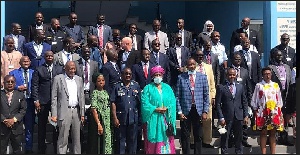The Kofi Annan International Peacekeeping Training Centre (KAIPTC) has held a five-day Induction Course for Directors and Analysts of National Centres for the coordination of Early Warning and Response Mechanism in ECOWAS member states.
The workshop, organised in partnership with ECOWAS and the West Africa Network for Peacebuilding (WANEP), sought to support the capacity of African Regional Institutions such as the AU and their relevant structures to effectively perform their mandates in ensuring peace and security in Africa.
In all, 45 participants from ECOWAS member states were expected to take part in the course to facilitate early detection, monitoring, and analyse conflict indicators through open data sources.
Air Commodore George Kweku Arko-Dadzie, the Deputy Commandant, KAIPTC, speaking at the opening ceremony, said this had become necessary as the changing security challenges that confronted Africa today were symptomatic of the transformation that had taken place over the past six decades.
“Despite the existence of regional security mechanisms and increasing roles of Regional Training Centres of Excellence such as the KAIPTC in building capacity and research, West Africa is still faced with security challenges,” he stated.
He noted there was a change in narratives from terrorism to violent extremism and their preventive counter measures.
Air Commodore Arko-Dazie said violent extremism in West Africa had taken deep roots in the Lake Chad basin and the Sahel region as extremist groups emerged out of local grievances.
He said the fight against these would continue as frontline personnel and peacekeepers adhere to necessary legislative conventions and precautionary measures.
He said the need for a functional and dynamic national early warning and early response mechanism remained critical in the region.
“Without adequate capacity in conflict analysis and early response, we will not reach far in our quest for sustainable peace and stable democratic governance.”
“It is my fervent hope that this induction course will provide the needed skills to enable participants to deliver their tasks of ensuring conflict prevention and transformation in their respective countries,” the Deputy Commandant stated.
Ms Finda E.M Koroma, the Vice President of the ECOWAS Commission in charge of early warnings system, noted that despite the operationalization of the ECOWAS early warning and response system and the collective security framework, individual member states were faced with various challenges that derailed development, peace, and security.
She said the goal of ECOWAS was to deploy the NCCRM to all 15 member states within a reasonable timeframe while mobilizing resources to improve and sustain their performance.
Ms Koroma said a proactive approach to conflict prevention was the surest way to deal with the persistent challenges that threaten peace and security in member countries.
“Our early warning mechanism and the envisaged gains must not be seen as merely an ECOWAS Commission affair”.
“Rather, it must be seen as a regional commitment and a collective effort by our member states to maintain sustainable peace and security in the region,” she noted.
She said to achieve these, there must be a strong political commitment by our member states and the people in our region must identify themselves with this commitment.
“Going forward our goal is to put in place an Early Warning System, with credible tools and cadres, as well as reliable products that could be shared with relevant government agencies in the region, especially national security agencies, dealing with various aspects of human security challenges and state security,” she stated.
The Vice President in expressing her gratitude to the organizers of the induction course pledged their continuous collaboration with the African Union, European Union, GIZ, and other partners to achieve the desired results.
Dr Chukwuemeka B. Eze, the Executive Director of WANEP, bemoaned the spectre of election-related violence, growing inequalities, violent extremism, piracy, unsafe migration, and persistent ethno-national conflicts that countries in the ECOWAS region continue to face.
He said now more than ever, National Centres for Coordination Response Mechanism in member countries were crucial and critical to find solutions to all challenges that threaten peace.
General News of Tuesday, 24 November 2020
Source: GNA

















